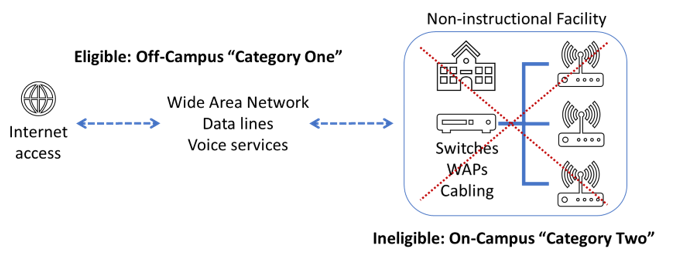Administrative and support personnel help schools and libraries function effectively. They manage and allocate the many resources necessary to properly serve the needs of students and library patrons. Many of the admin and support personnel work out of centralized buildings that serve multiple facilities. These people may not be in the classroom or library; but they are essential, nevertheless, and play a very important role.
Unfortunately, the FCC’s rules limit the financial support admin facilities can receive under the federal E-rate program. Rules specifically prohibit discounts for networking equipment that serves non-instructional facilities. This reduces the amount of Wi-Fi equipment that applicants can purchase, increases administrative complexity, and slows progress in school and library systems. The FCC needs to eliminate these rules and to allow funding for networking equipment that supports non-instructional facilities. By doing so, the FCC will simplify the E-rate program and help applicants get the support that they need much faster and with fewer headaches.
###
The State E-rate Coordinators’ Alliance (“SECA”) recently filed a
formal request that the FCC revise the regulations for networking equipment used at admin sites. Funds For Learning
supports this motion and further recommends that there be no restrictions placed on networking equipment at admin sites.
This should be a simple, straight forward decision for the FCC. Administrative and other support sites, also known as non-instructional facilities (“NIFs”) are crucial for the operations of a school or library system. Through these central facilities flow people, services, packages, information, and so on.
Recognizing the practicality of the situation, the FCC currently provides E-rate discounts for Internet access and data services that deliver information to NIFs. This makes perfect sense. Of course, Internet access to the district office is eligible! Why then isn’t the computer network at the NIF also eligible? Below is an illustration.

Category One services (i.e. Internet and data lines) to a NIF qualify for support. Category Two services (i.e. on-campus computer networking) do not. How can a site be “sort of” eligible for E-rate discounts? How is that the Internet access coming to a building can be eligible for support, but stops being eligible once it gets on-site? It makes no sense.
To make matters worse, if shared network electronics that support schools also support a NIF, then the FCC rules state that a portion of the cost of eligible equipment needs to be removed from the E-rate funding request. This requires a cost allocation, which is subject to debate and approval by USAC. This leads to extra complexity, reduced support, and delayed funding commitments… all because a NIF, which is home to vital staff and which qualifies for Category One E-rate discounts, may also need Category Two support.
###
Funding year 2021 marks the beginning of a
new chapter in the E-rate program. With the move to system wide Category Two budgets, now is the time for the FCC to reduce complexities and to eliminate rules that are no longer applicable.
What do you think? Is networking equipment for non-instructional facilities necessary? Should NIFs continue to be considered ineligible for Category Two support? Every E-rate stakeholder is encouraged to let the FCC know the answer to these questions. Below is a list of some of those that have already weighed in.
- State E-rate Coordinators' Alliance (link)
- Funds For Learning, LLC (link)
- Florida Department of Management Services (link)
- Iowa Department of Education (link)
- New Mexico Public Education Department (link)
- West Virginia Department of Education (link)
- Advanced Data Services (link)
- AdTec, Inc. (link)

